Ambition Meets Innovation in Chronicles of Elyria
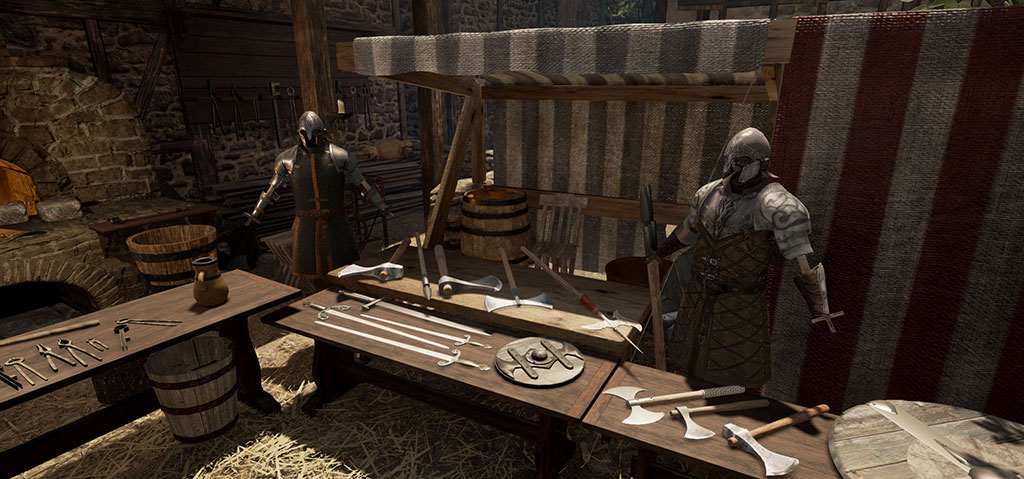
Each week I spend roughly 8 hours scouring the internet for new and interesting concepts coming toward the MMO world. As a leader of a very large community, I always have to keep my eyes on the future and see the road before us. Along my journey I stumbled across a new title that simply blew my mind.
Chronicles of Elyria is a fresh new concept to the MMO scene. It is by far the most dynamic and immersive MMO I have seen. While in most games you play a solitary character for the length of the game, Chronicles of Elyria sends you on a journey through the lineage of a family. In the time you play you experience the life of a young lad or las, who grows into adulthood. As they mature decisions you make will prolong or shorten your life. Upon death you continue your story through your progeny.
As a programmer, this game makes my brain hurt. The amount of logic and attention to detail is phenomenal. Fortunately for me, we are blessed with the opportunity to speak directly to a developer who can help explain this massive undertaking of a game.
Greetings! Thank you so much for joining us today to talk about your new title Chronicles of Elyria. Before we get started can I ask you to introduce yourself and your role in Chronicles of Elyria?
Thank you! It’s a pleasure to be here. My name is Jeromy Walsh. I’m the Owner of Soulbound Studios and am currently acting as both the Technical and Creative Director on Chronicles of Elyria. I’ve spent the last 15 or so years as a software engineer and game developer, working for companies like Liquid Entertainment, Pandemic Studios, and Microsoft, and am super excited to be working with a talented team on our own game now.
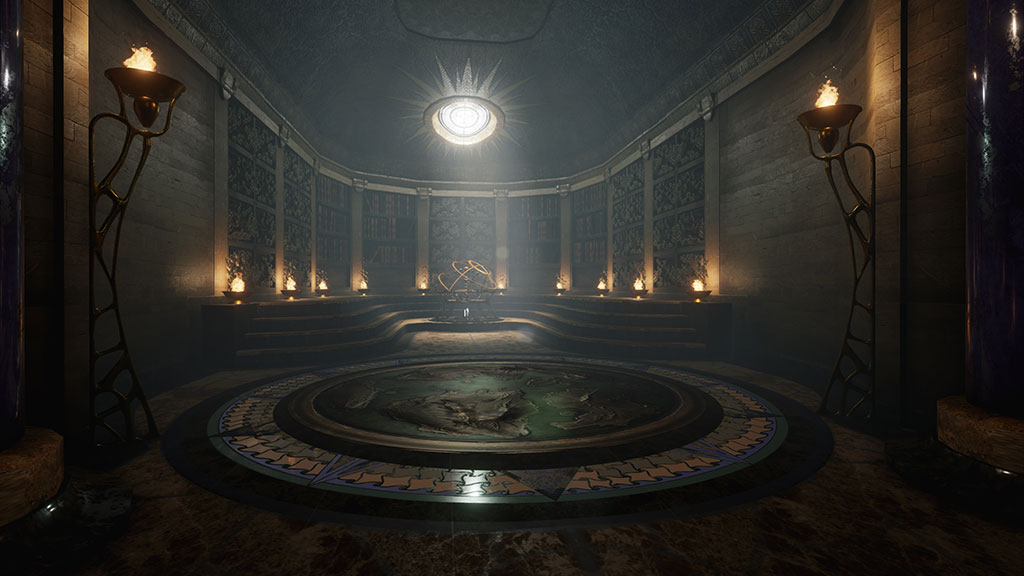
Just with a quick glimpse at the scope of this project you can tell this is quite a project. How large is the team working on CoE?
Absolutely. We currently have nine people directly responsible for the development of the game and its assets. We have an additional three people doing community management and outreach, as having a close connection with our community is extremely important to us.
That said, we’re growing rapidly at the moment so our team size is a bit of a moving target. In the last week we’ve hired a new 3D Environment Artist as well as a new Animator. And we’re not done yet. We’ll be bringing on another three to four people over the next three months.
What type of technology is making this game possible? Are there any engines, software packages, or techniques that have made development easier?
Definitely. So, on the client-side we’re leveraging the Unreal Engine to dramatically reduce development time. Having an established asset pipeline that allows us to prototype landscapes and to visualize objects in the world quickly has saved us a ton of time. And that’s not even talking about the run-time benefits. We’re really happy to have UE4 support for rendering, animation, physics, user input, user interfaces, etc. right out of the box. And the quality is really good as well. People are constantly amazed by how good the game looks. We recently took a screenshot of our new grass shader, along with a new sky. It looks almost photo-realistic.
In addition to that, we’re currently doing internal testing of a few client libraries for things such as global illumination, physics, and destructible objects. But we can’t talk about them for NDA purposes.
Finally, we are talking to some middle-ware companies to license some additional back-end technology. We’ve already got a lot there, but as a small studio it’s important we leverage as much existing infrastructure as we can. If we do end up licensing any of the server-size middle-ware, we’ll definitely make an announcement about it, as it could be big news.
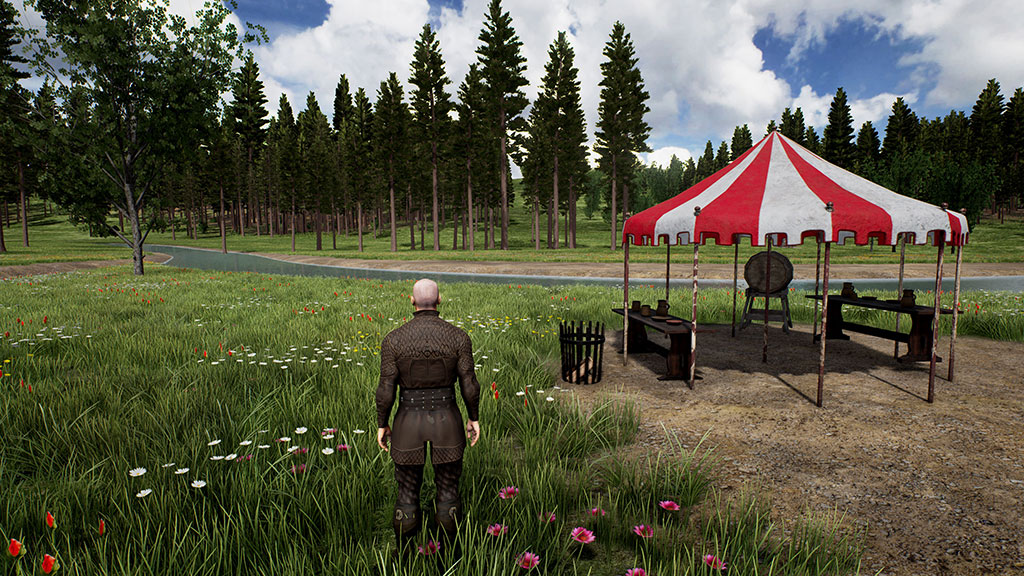
What system are you most proud of? Is there one piece of this massive game that you think shines above the rest and why is it your favorite?
Well, we’re still in early development and our engineering hasn’t caught up with our design quite yet. So I think there’s a difference between the systems I’m proudest of as a designer, and the systems I’m proudest of as an engineer.
From a design perspective, I’m most-proud of our dynamic story engine called the Soulborn Engine. While it’s still in early development, and the nature of it means it won’t be fully functional until near the end of the project, we believe it’s our story engine that’s going to make this game feel different from any other MMORPG.
We’re working to create a world that feels constantly in motion, with events transpiring on the personal, local, regional, national, and global scale. If we nail the design, players can expect to split their time between the things they want to be doing – exploring, crafting, producing, role-playing, building, etc. and responding to the events that are happening to them – not just around them. These events will feel consequential, and with luck, players will really enjoy the interaction with the world and the stories it creates.
From an engineering perspective, I think the team is proudest of the aging and dynamic body mechanics. These are closely related and basically mean that as time passes, characters are constantly aging and changing. Their faces, skin, and bodies slowly show the passage of time. It’s very subtle, and often times community members are surprised to see the difference when they go back and look at what the character looked like decades previously. The dynamic body system means your character’s leanness and weight changes dynamically. So you could end up with a fairly portly character, or the next Conan. The combination of the aging mechanic, and the dynamic body mechanic, means characters look radically different. All of this is technically challenging as it requires animation blending across multiple dimensions and needs to be developed in such a way that armor still looks good as the character’s body changes.
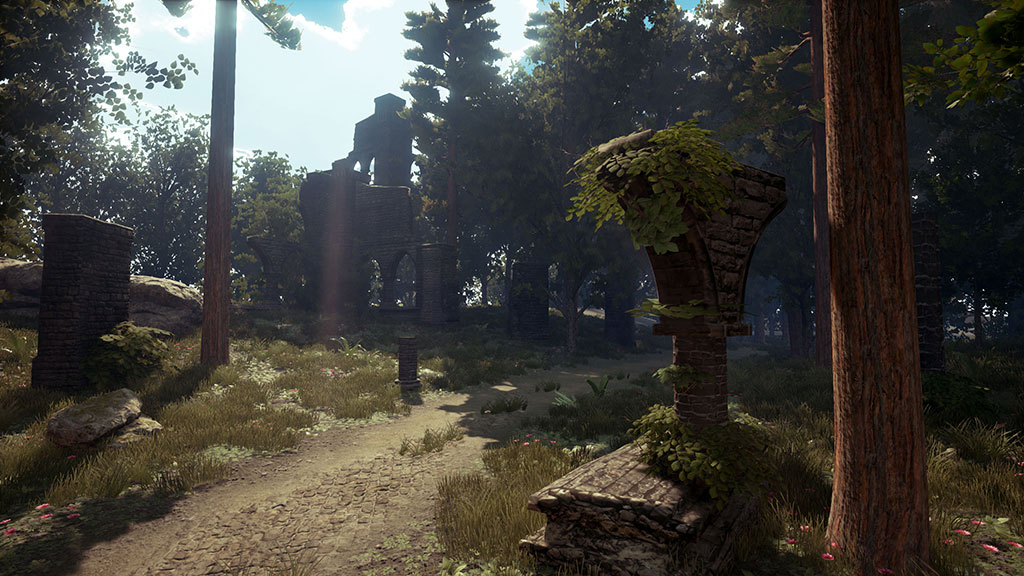
I heard you recently made changes to the Skill System in Chronicles of Elyria, compared to what you’d written about in earlier design journals. Can you tell us a bit about what those changes are and what motivated those changes?
Sure. I’ll start with the why first, and then talk about the what. When designing the skill system for Chronicles of Elyria we had a few design goals in mind. First, we wanted the different skills to be challenging and immersive, and to require a combination of both character skill, as well as player skill. We also wanted skill-building to be communal. This is an MMORPG after all, not a single-player RPG. The other thing we wanted was a way for players of roughly the same skill-level to be able to play with others of the same skill, regardless of what their characters’ skill-levels were. We know our target audience is a little older, likely have careers and families, and we wanted to make it so that our audience could easily jump in and out of the game without falling too far behind.
So what did we do about it? Well, to begin with, we’d always had it in mind to allow players to teach one another. But previously, we were stuck in the rut seen by other MMOs where you had to reach some skill level, let’s say a skill of 20pts before you could go to someone so they could train you and you could “unlock” the new skill. This felt very discreet though, and didn’t really encourage teamwork. So we’ve made a change to how skills are learned. Now, skill development is largely a cooperative mechanic. To first learn a skill, you can either read about it, or to expedite the process you can observe others performing the skill. This is true whether the skills are some kind of crafting skill or a combat technique. By partying up with someone and either adventuring or becoming part of the crafting process, you gradually learn a bit more about the skills they’re showing you.
After a while, you’ll be able to practice the skills yourself with the guidance of others, and then finally be able to execute your skills on your own. This whole process firmly creates a master/apprentice model, and creates a new reason for players to go out and interact – to find masters who have skills they want to learn. It also means that as your character reaches their golden years and is unable to perform the skills as well as they used to, they’re more likely to take on the role of wise old master, and pass on their knowledge to the next generation.
The other change we’ve made recently is introducing a new mechanic called “Bolstering”. There’s nothing magical about it. When we play alone, it doesn’t really matter what our skills and attributes are. We self-regulate the challenges we take on so we feel productive. It’s only when we team up with others that differences in stats become apparent. I despise that feeling in games like Diablo 3 where you’re partying with a group of friends who are higher level than you. They’re either forced to come down to your level, or you’re forced to roam around with them. In the latter case, you feel utterly useless as you do no damage to monsters, and you die if you’re even looked at by an elite mob.
So what we’re doing to remedy this is allowing family members (those in the same in-game family as you) to bolster their siblings/children, etc… If you’re in a group together, the weaker individual’s stats are brought up in parity (not equality) with the stronger character. This means when grouping up with those more powerful, you’re “bolstered” by them, and become more powerful yourself. This encourages playing with your real-life friends who have a bit more free-time than you do, rather than discouraging it. It also means you should be more careful about who you pick on in the game. You never know who their big-brother might be. And when he comes to seek revenge with his little brother, both of them are going to be stronger as a result.
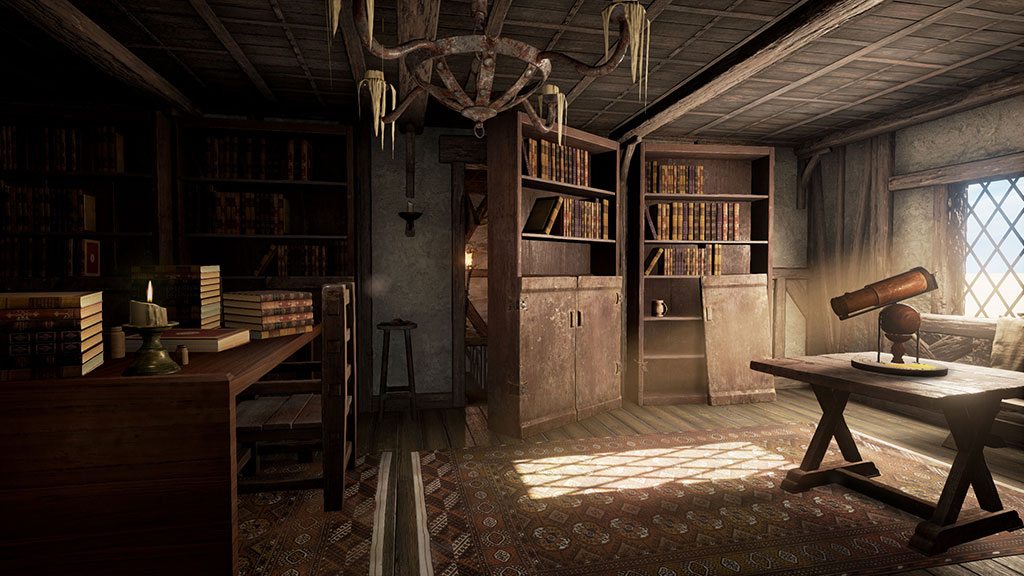
Let's jump into the plotline. As the game begins, what is the general backdrop to your story?
So, this is one of the things we’re doing with this game that adds an element of intrigue. Rather than being completely forthcoming with our established lore, mythology, and cosmology, we’re intentionally withholding a lot of that information from the player. Our goal is to enter game launch with players knowing roughly the same things that characters would.
Instead of saying “Here’s the list of gods”, we’ve instead introduced multiple religions into the world, each of which has their own sets of deities (or none at all), and each believe they’re right.
Similarly, we don’t have a single cosmology or story of how the world has been created. Instead, each religion or culture has their own belief – some may be right, some may be wrong, or maybe they’re all wrong.
We’re doing this because a lot of conflict in our world is notably about what we believe, not what we know. By introducing diversity into our lore, and then providing incentive for the players to fight amongst themselves, we’re creating further opportunity for conflict and a compelling story.
With all that said, the general backdrop is a low/mid-fantasy world in which some cataclysmic event, thousands of years past, has split the world into different planes of existence. Magic, if it ever existed, has long been forgotten, and if gods ever existed they appear to have abandoned the world. But as time passes, depending on player actions, we may yet feel the presence of the Ancients, we may once again see the effects of magic, and most significantly, we may see the planes once again begin to converge.
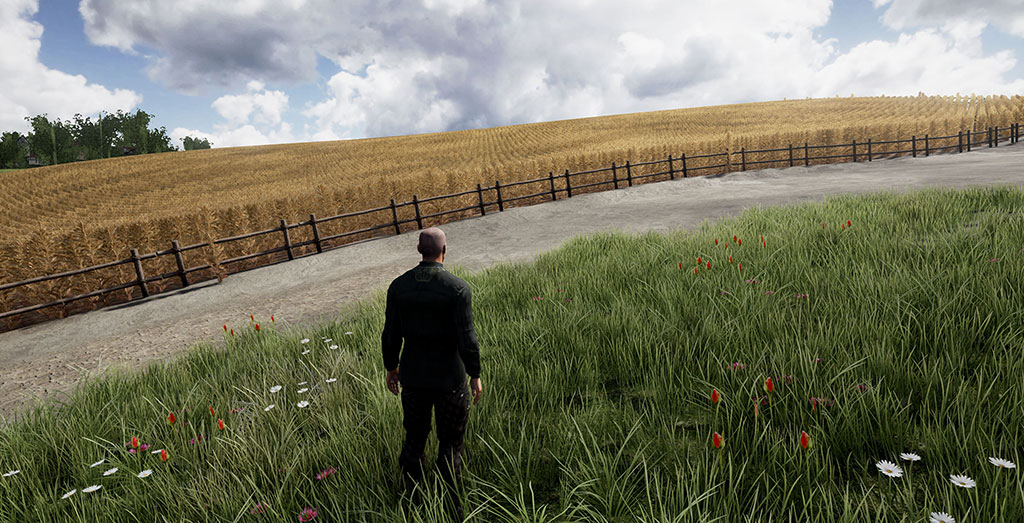
What can we expect from the character creation process?
In Chronicles of Elyria, players aren’t just playing a single life of a single character. Instead, they play as a soul reincarnating over multiple lifetimes. As a result, players begin character creation by picking the soul they want to play.
Next, they decide whether they want to play as a Ward – a younger individual who doesn’t have a family and has grown up in an orphanage, or as the child of a player-ran or NPC-ran family. In the latter case, some of their choices in appearance, etc. are constrained by the family they choose. This is because character creation is genetics based, and family members will often be recognizable by some common traits.
Next, they’ll choose their birthdate, which influences which family they can choose and also helps set their destiny.
Finally, players will select the family or orphanage they’re from and will then be able to customize the appearance and/or skill set of their character.
No matter what choices they make, however, character customization doesn’t end with character creation. How they play their character will have as much impact on what their character ends up looking like as what they set the sliders to during character creation.
Let's talk about death. Death in CoE takes on a somewhat beautiful form. There are three types, Incapacitation, Spirit Walking, and Permadeath. Can you tell us a little about each of these?
Absolutely. Incapacitation is the least costly form of death. It’s what most animals will do to you, and it’s what many NPCs will do to you. When you’re incapacitated you’re simply knocked unconscious for (currently) three minutes. During this time other players can cut your purse, and take any weapons or other things you had in your hand. For example, if you were carrying the reins of a pack-horse or other form of transportation. But this form of death doesn’t come with any long-term costs aside from needing to replace a couple items.
The next form of death – Spirit Walking, is what happens when someone incapacitates you and then performs a coup de grace. This is a killing stroke which forces your soul out of your body and back on to the astral plane. Players will then have a time-limited journey they have to take to make it back to their body before it perishes. And yes, we do elegantly handle DC’s and network related problems that can occur. While the player is Spirit Walking, pretty much everything but clothes they are wearing can be looted. Someone can take their backpack off and look through it, they can take any rings or other jewelry off, their boots, gloves, etc. The only thing that can’t be looted is armor, and of course, things that can’t be easily discovered, like hidden pockets.
Finally, we have Character Permadeath. This is when you fail to make it back to your body in time. This most happens in the later years of a character’s life when their connection to the physical world is the weakest. When this happens, the character dies, and the soul returns to the Akashic Records (soul selection), to be reincarnated into the life of another character.
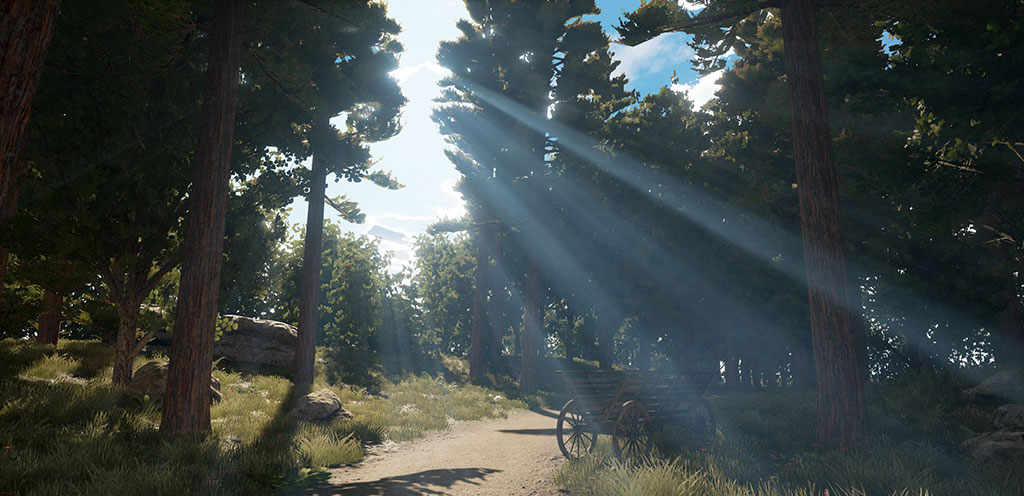
I have to admit the whole Spirit Walking idea, really piqued my interest. The idea of being tied to the world by the ones you loved has a bit of beauty to it. Talking about family ties, can you explain to us the "Family" concept and how it applies in CoE?
Sure. In short, a Family in Chronicles of Elyria is a type of social organization you can choose to join at character creation.
Families in CoE serve a couple different purposes. First, it’s a social element. Players who are just starting the game often look to guilds in order to help them out. However, guilds in CoE serve a different purpose. So when beginning Chronicles of Elyria it’ll typically be the family you look to, in order to get early assistance. The family you join provides you room and board, they give you maps for navigating local landscapes, and they give you a set of starter equipment.
Second, it’s through families and dynasties that towns tend to develop. It’s through the process of friends and families settling next to each other, building shared resources, etc. that hovels become villages, villages become towns, and towns become cities. And over time, the larger dynasties will begin to spread out, gain more influence over their region, and can eventually make a claim on the local County, taking over as the region’s nobility. Through increasing the size and influence of their dynasty, they can eventually work their way all the way up to higher tiers of nobility, eventually making a claim on the throne itself.
I think your game has a lot of potential to teach people about life and how it connects from one generation to another. My only worry is the griefer. How does CoE plan on handling the players who play solely to ruin the experience of others? In a game where permadeath exists how can players like my mother, who plays games with caring and compassion for all, be protected from players who seek to ruin the experience for others?
No surprise, that’s one of the first questions we’re asked when we tell people we’ve got character permadeath in the game. The short answer is, killing, or really any crime in Chronicles of Elyria, is illegal in most places. Getting caught for crimes you’ve committed forces you to pay a heavy cost. The more severe the crime, the heavier the cost. We’re currently iterating on what those costs are, but they range from time (maybe a couple days) spent in a prison doing other activities, to atrophied attribute scores, all the way to spirit loss.
No matter which form of penalties we ultimately go with, the punishment for crimes committed will almost always be worse than the impact of the crimes themselves. For example, if you coup de grace someone and cause them to lose spirit, you’ll lose the same or more spirit if you’re caught.
The end goal is that crimes in Chronicles of Elyria are possible, but discouraged. We want criminals to have to think carefully about risk vs. reward. So while stealing, pillaging, killing, etc. are possible in the world, we want players to do them for a reason – a game-specific reason other than just for the fun of it.
After the game launches we’ll continue to tweak the punishments such that maybe 15% of players actually have the stomach for being criminals. I know that doesn’t sound like much, but 15% causing random havoc is more than enough to add interesting story elements – which is really why we allow crimes at all. More opportunities for dramatic storytelling.
In addition to punishment for crimes, it’s also about opportunity. If you know your chances of getting caught increase the closer you are to a populated town, the more likely you are to perform your criminal activities outside the reach of city guards. This creates a natural safety buffer around town, where the more remote the area, the more likely you are to be ambushed. This is nice as new players or those less confident in their skills can stay closer to town where it’s safer.
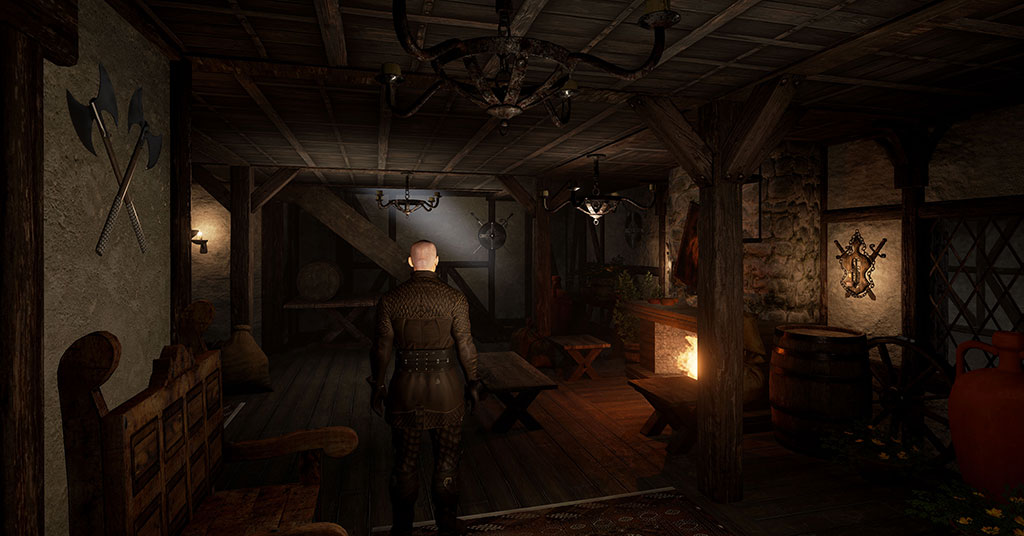
Many games crown kings or emperors based on how many points a certain player earns. This usually places a person concerned with themselves in the leadership seat which doesn't usually end well for the rest of us. How do you plan to put the person who is interested in leading, shepherding, and governing their people in a place of leadership. Not by earning self gratifying points but by leadership ability. How do you plan to get "we" thinkers instead of "me" thinkers in a place of power?
That’s a great question, and one I haven’t heard before. The short answer is that in most cases, the role of nobility and the title of Count, Duke, or King (or their female equivalents) has to be earned through successful leadership. Aside from the statistical stuff we’ll add to help gauge how successful you are, you are always at the mercy of public opinion.
When you first become a Mayor in a region, you gain a new user interface that acts more like a town management simulation. You’ll be able to break the parcels of land up into zones and specify where markets should go, blacksmiths, inns, taverns, etc. Each new building constructed by the town’s members will help add value and resources to the overall community. If you’re an effective Mayor, and everyone prospers, you’ll be able to stay in power longer.
As you grow your influence, as the town gets larger, and your dynasty develops, you may eventually be able to become a Count. As a count, you’re now responsible for a larger area of land, and multiple towns or Keeps. Now your focus is much more on resource management. You need to make sure your region has appropriate military defenses, a thriving economy, and enough trade to keep your region in the supplies that it needs. As with before, if you’re an effective leader your entire county will prosper. If not, you’ll be ousted by a pretender and lose your role as Count.
This same process continues as you advance to Duke, and then eventually to King, where you can set national laws and tax rates. At each step of the way your ability to advance depends on your popularity, your success in managing your estates, and the prosperity of your domain.
I would like to take an opportunity to talk about Guilds. How will guilds tie into the big picture? What is your vision for communities within CoE?
When designing Chronicles of Elyria we’ve thought hard about why people play MMOs and have attempted to cater to wide variety of player needs. We’ve also thought a lot about different player scenarios. In particular, we’ve thought about individuals playing solo, couples who want to play together, small groups of friends, families, or co-workers who might enjoy playing together, and finally the larger established guilds out there.
For each scenario, we’ve tried to ensure there’s a path of progression and something for each of the groups to do. In the case of in-game guilds, they’ve really been designed with the larger player guilds in mind.
Guilds in Chronicles of Elyria are a bit different than guilds in most games. In CoE guilds are businesses and are more like traditional guilds. There’s blacksmithing guilds, tanning guilds, assassin’s guilds, and even thieves’ guilds. In all cases, the guilds employ members of the community to perform services for them. In exchange, the guild provides services such as exchange of information, access to resources, and the ability to produce or perform their trade faster.
One of the main differences is that in most MMORPGs guilds are intentionally centralized. If there’s a guild hall, it exists in one location. In Chronicles of Elyria, it’ll be fairly common for the guilds to stretch across multiple counties, duchies, or even kingdoms. Seeing your guild’s sigil on a smith, an inn, or bank lets you know immediately that you’re among trusted members of your guild. Whether or not they’re friends or not, is debatable.
One of the other differences is that you can be in multiple guilds simultaneously. That is, you can be a member of a blacksmithing guild, as well as a thieves’ guild. However, it would be a conflict of interest for an identity to be a member of multiple blacksmith of thieves’ guilds simultaneously. So if you want to perform any kind of espionage, you’ll need to don a new identity and put on a disguise before you attempt to join that second thieves’ guild.
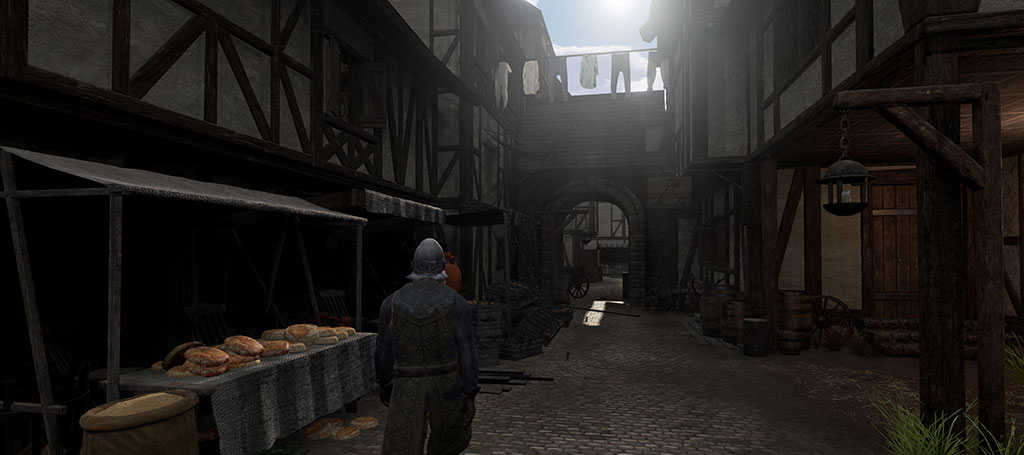
How large can these communities get? What role will they play in the game world?
There’s really no limit to how large they can get. With the ability to distribute your guild across multiple locations, appoint middle managers, etc. they could quite easily reach hundreds or thousands of players for the larger guilds.
As to what role guilds will play, their services, or lack thereof, could have huge impact on a region. And if an aggressive guild wants to attempt to create a monopoly in a region they could make it difficult for other smaller crafters or organizations to form. I’m excited to see what kinds of cartels are established, and what the community and in-game governments will do about them.
Can they take ownership in towns and villages and use that ownership to help others and benefit the player base at large?
That’s the idea. Good guilds will establish themselves in starter towns to help provide services. In exchange, they’ll have a constant supply of customers to help them fund their business.
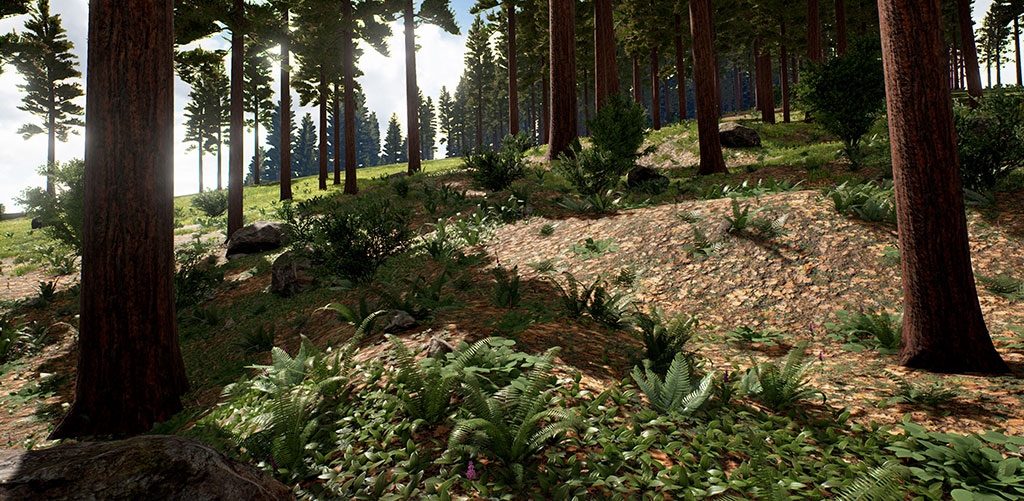
What is your rough timeframe for deployment? Are you looking at 2016 for early testing and launch sometime in 2017? Or is it more distant than that. Granted game development is organic and nothing stays the same or goes according to plan, but in the perfect storm when would you like to see the product launch?
You’re absolutely correct. We’re still in early development and so the “Cone of Uncertainty” is still very large. In particular, we’re currently self-funded, but that’s going to have to change in early spring. We’ll be running a Kickstarter campaign which will determine how much additional capital we have to work with. Once we know how much money we’ll have to fund the game, we’ll have a clearer picture of when the game is likely to be finished.
With that said, we have a good idea of when we’d like the game to be available to our players. At the moment, we’d like to be feature-complete by the end of 2016 with some closed alpha testing, with additional testing and an extended early access happening the first and second quarters of 2017, and a broad release date of Q3 2017.
What platforms will the game be available on? Will it be region locked? Can players from all over the globe play together?
The Unreal Engine is portable across a lot of different platforms and operating systems, so we’re leaving our options open. However, we’re testing and developing on Windows PCs at the moment and that’s the experience we’re optimizing for.
As for regions, we do plan to host servers in multiple regions – NA, EU, AU, and JP, for example. Whether or not players will be able to play across regions is still undecided. The approach we’re taking is to assume there is cross-region play until we discover a reason there shouldn’t/can’t be.
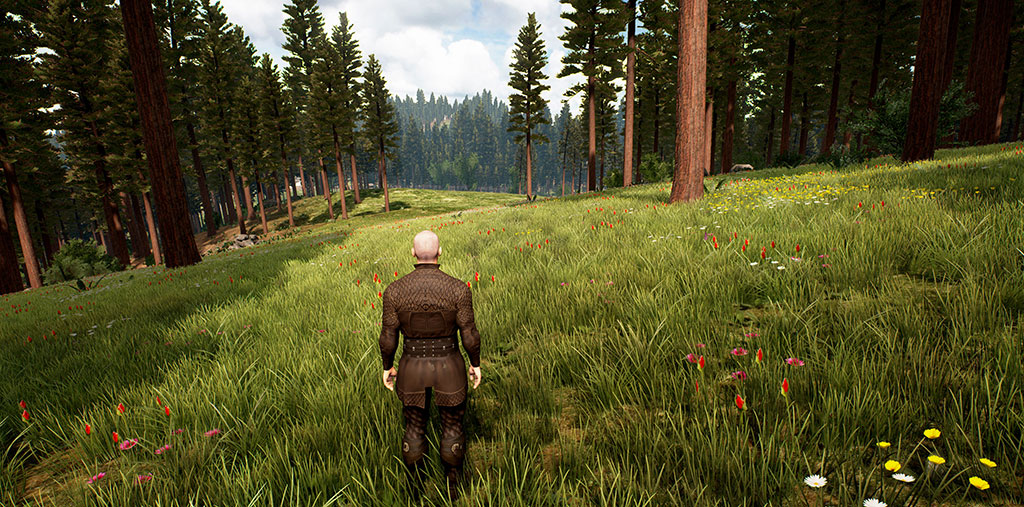
This issue of Gaiscioch Magazine is titled “Dream Builders”. Now, I know this game has been a passion of yours for a very long time, but you’ve just been able to pull a team together in the last year. Can you tell us what it’s like finally building your dream?
It honestly hasn’t sunk in yet. I mean, on the surface it feels amazing, but also a little surreal. I absolutely love seeing the game come to life within my team. I also really enjoy interacting with the community the way we do.
We knew early on that the unique nature of this game would require crowdfunding to get it funded. But because we know the community are our investors, we’re bringing them along with us every step of the way. We do weekly Q&A’s on a community member’s YouTube channel, we’re as open and honest as we can be in our forums, and we’re almost always in IRC answering questions. We really feel like if the community is going to help make this game a reality, we need to treat them with the candor and respect they deserve from the very beginning. Not just when we’re asking for money.
That all said, actually being here and making this a reality is a ton of work. There’s no shortcuts. As the head of a small studio I wear a lot of hats. I’m currently acting as the Technical Director, Creative Director, Producer, the HR person, the accountant, the IT guy, and one of the programmers. That means that on any given day, at any given time, I’m doing something CoE related. There really isn’t much down-time right now and it’s been literally weeks since I’ve played a video game, other than what we’re developing.
Is it all worth it? Absolutely! At the end of the day, the hard work feels like I/we are really earning our keep. There’s something extremely gratifying about putting your all into something. Putting your all in, like you’ve never done before. It’s such a great feeling to just let the work become your focus and really let your dream consume you.
Final question, what do you hope players take away from playing CoE?
We really want them to take away that it’s all about the journey, not the destination. Each of us have an opportunity to tell our own story, and live our own lives. This is true both in-game, and out-of-game. Whether we’re talking about Elyria or Earth, we each have a unique set of memories, skills, and talents that define who we are. And whether we’re talking about Elyria or Earth, and no matter what your religion, each life matters. You should take every opportunity to develop yourself, connect with those around you, and decide what legacy you’ll leave behind when you’re gone.

Support Chronicles of Elyria on Kickstarter
About the Author

Foghladha
Managing Editor
Foghladha founded the Gaiscioch Social Gaming Community in 2001 and has since been the founder & activities director for this well known community. His role has gone beyond just running the Gaming Community and now includes running the Athletics Program in Portland, Oregon, as well as acting as the Managing Editor of the Gaiscioch Magazine, and is the Lead Producer on the Gaiscioch Livestream Productions. Additionally he networks with game developers to form relationships between Gaiscioch and development studios.
His experience in publishing dates back to helping his Grandparents who operated a printing press for over 40 years. In high school and college Benjamin excelled in journalism and played an active part in the school newspaper. Foghladha currently works full time as the director of technology for a franchise trade publication & education company.
